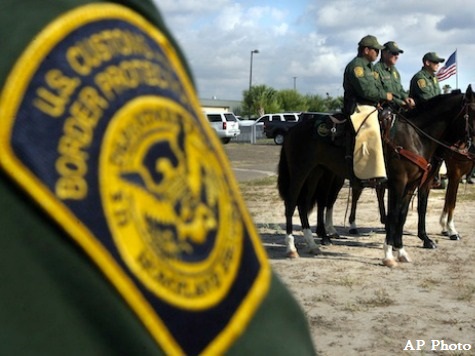AUSTIN, Texas — At a panel discussion organized by the Texas Public Policy Foundation at the Texas Capitol Wednesday, National Border Patrol Council (NBPC) Vice President Shawn Moran shared his thoughts about the current challenges facing border patrol agents — most crucially the understaffing issue — and offered his thoughts on the best solutions. After the panel, Moran granted an interview to Breitbart Texas and expanded on many of the topics addressed during the panel.
Moran repeatedly emphasized the problems created by the government’s failure to fully staff the Border Patrol with the total number of agents authorized by law. In Texas, there are only an average of seven agents assigned per mile of border, and in other border states, the number rises slightly to 14 to 17 agents per mile, but the actual number of agents in the field at any time are less than a third of those figures, due to three separate work shifts, plus sick and vacation time.
In fact, the NBPC views the understaffing issue as so important, and so serious an impediment to border security, that they are supporting a bill currently being considered in Congress that could result in pay cuts for some agents.
The Border Patrol Agent Pay Reform Act, sponsored in the Senate by John McCain (R-Arizona) and Jon Tester (D-Montana) and by Jason Chaffetz (R-Utah) in the House, would change the way that agents can earn overtime compensation. According to the Congressional Budget Office, the current system pays agents up to twenty five percent of their base salary whenever they worked more than 80 hours in a pay period, under what is referred to as Administratively Uncontrollable Overtime (AUO), or unscheduled but necessary overtime. Agents can earn additional overtime — usually 50 percent extra — under the Fair Labor Standards Act (FLSA) or the Federal Employee Pay Act (FEPA).
The new law would eliminate overtime under AUO and FLSA and create three tiers from which agents could choose: 1) work 100 hours each pay period for a 25 percent increase in base salary, 2) work 90 hours each pay period for a 12.5 percent increase, or 3) work no overtime. Again, the current system arguably would provide higher compensation for some agents, but it has also been criticized as vulnerable to abuse. Moran also told Breitbart Texas that this reform would lead to better pay stability for agents, by implementing a consistent system and eliminating the worry that AUO could be cancelled. Agents “want something that can’t be deauthorized by a bureaucrat.”
More importantly, the savings and more predictable salary expenses under the proposed law would allow the Border Patrol to hire more agents so that they would be fully staffed. According to Moran, staffing the Border Patrol up to one hundred percent of their legal authorization would mean hiring 1,200 more agents. Notably, this number is greater than the 1,000 Texas National Guard troops recently deployed to the border by Texas Governor Rick Perry.
Both Moran and Breitbart Texas Managing Director Brandon Darby — who also participated in the panel — have voiced concerns that the use of the Texas National Guard is not the best approach to address the current border crisis, because of their more limited rules of engagement. The National Guard’s activities will be limited to “deter and refer:” to serve in a supportive role, to be a “force multiplier” and be additional eyes and ears along the border who can report any illegal drug or human trafficking activity to the Border Patrol who would retain responsibility for detaining and processing people. However, as Moran had pointed out, the understaffing of the Border Patrol means they are not always able to efficiently respond to all the reports they are currently receiving along the border. Adding additional personnel who can make reports but will not be engaged in detaining people only exacerbates this problem.
Moran’s view was that instead of deploying the National Guard, “the money could be used elsewhere…really, what good is it going to do?” he asked, especially since the National Guard were only being deployed to one sector, the Rio Grande Valley sector. Moran compared the current deployment to Operation Jump Start, a George W. Bush era program that deployed National Guard troops along the border with Mexico under similarly restrictive rules of engagement. The total cost for Operation Jump Start was $1.2 billion, but Moran remarked that the program did not show many noticeable effects regarding apprehensions of people illegally crossing the border.
Part of the challenge, of course, is that hiring more Border Patrol agents, reforming their pay structure and rules of engagement, and addressing the problematic issues with our immigration laws are all under the purview of the federal government. With a divided Congress and Obama’s failure to act to address the border, quick action seems unlikely and Texas officials are limited in their options. Moran agreed that while deploying the National Guard may not the best way to address the border crisis, there was not much else Governor Perry could do.
On a more positive note, when asked about Border Patrol agents buying with their own personal funds diapers, food, and other supplies for minor children who were apprehended crossing the border, Moran said that had mostly ceased. The Border Patrol had shifted their resources to cover these items, and it was becoming less and less likely for agents to have to purchase them out-of-pocket. Moran said that there was never an official policy or requirement for the agents to purchase these supplies, but that it was just “agents being human beings.”
Read prior Breitbart Texas coverage of this border security panel.
[Disclosure: the author of this article was previously employed by the Texas Public Policy Foundation.]
You can follow Sarah Elizabeth Rumpf on Twitter at @rumpfshaker.

COMMENTS
Please let us know if you're having issues with commenting.